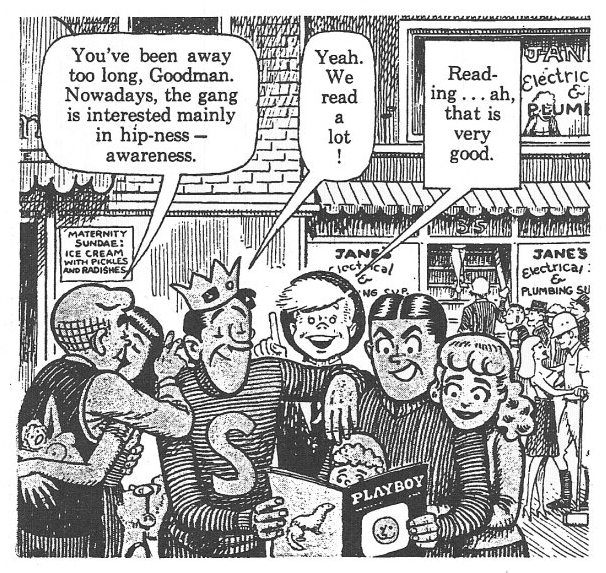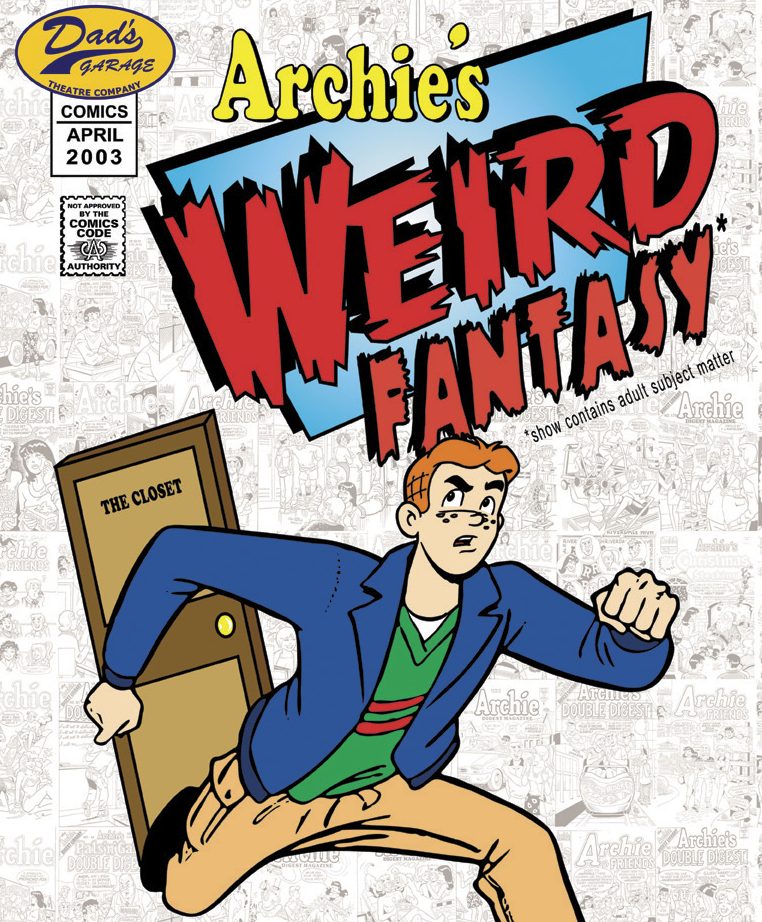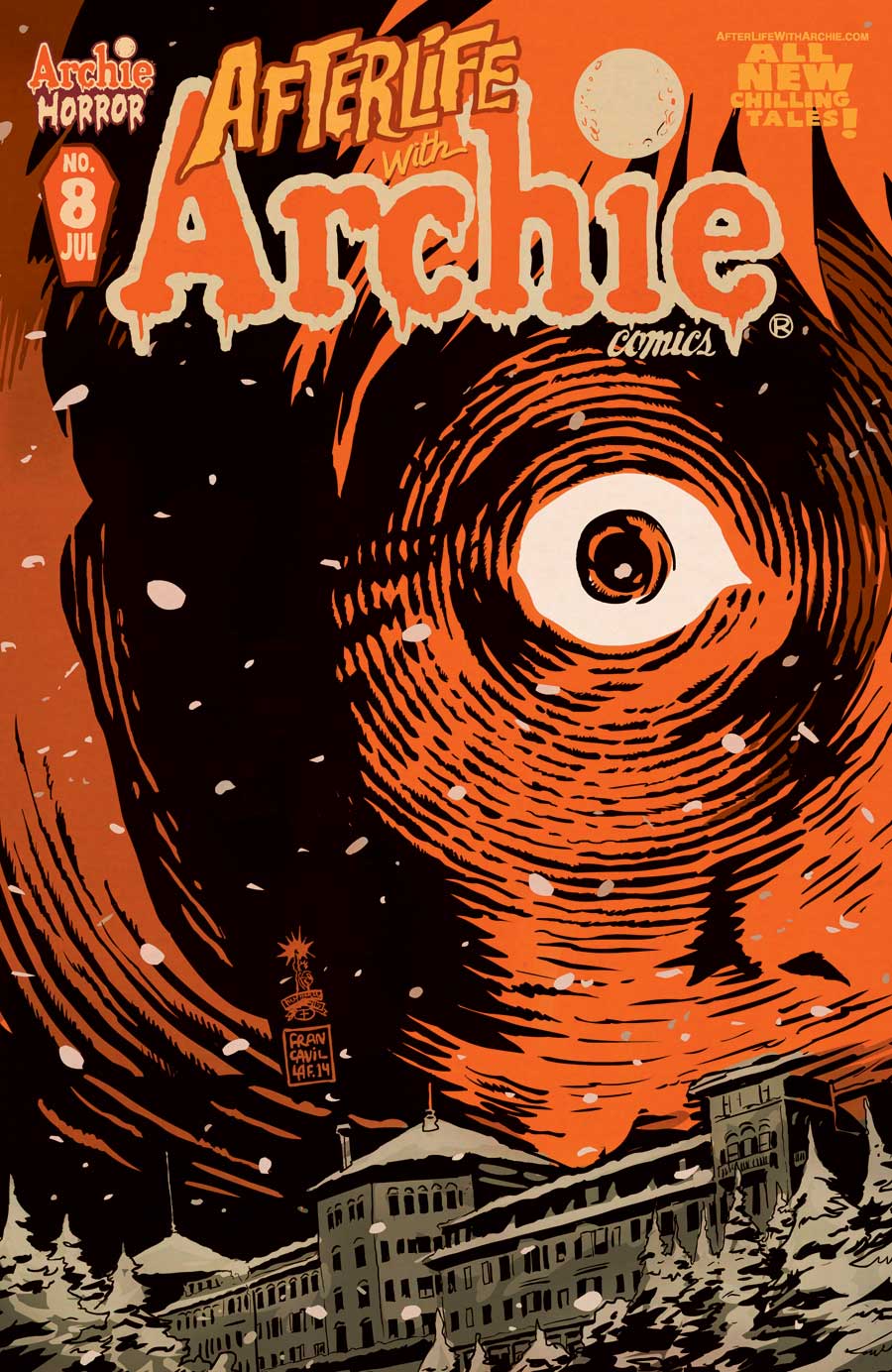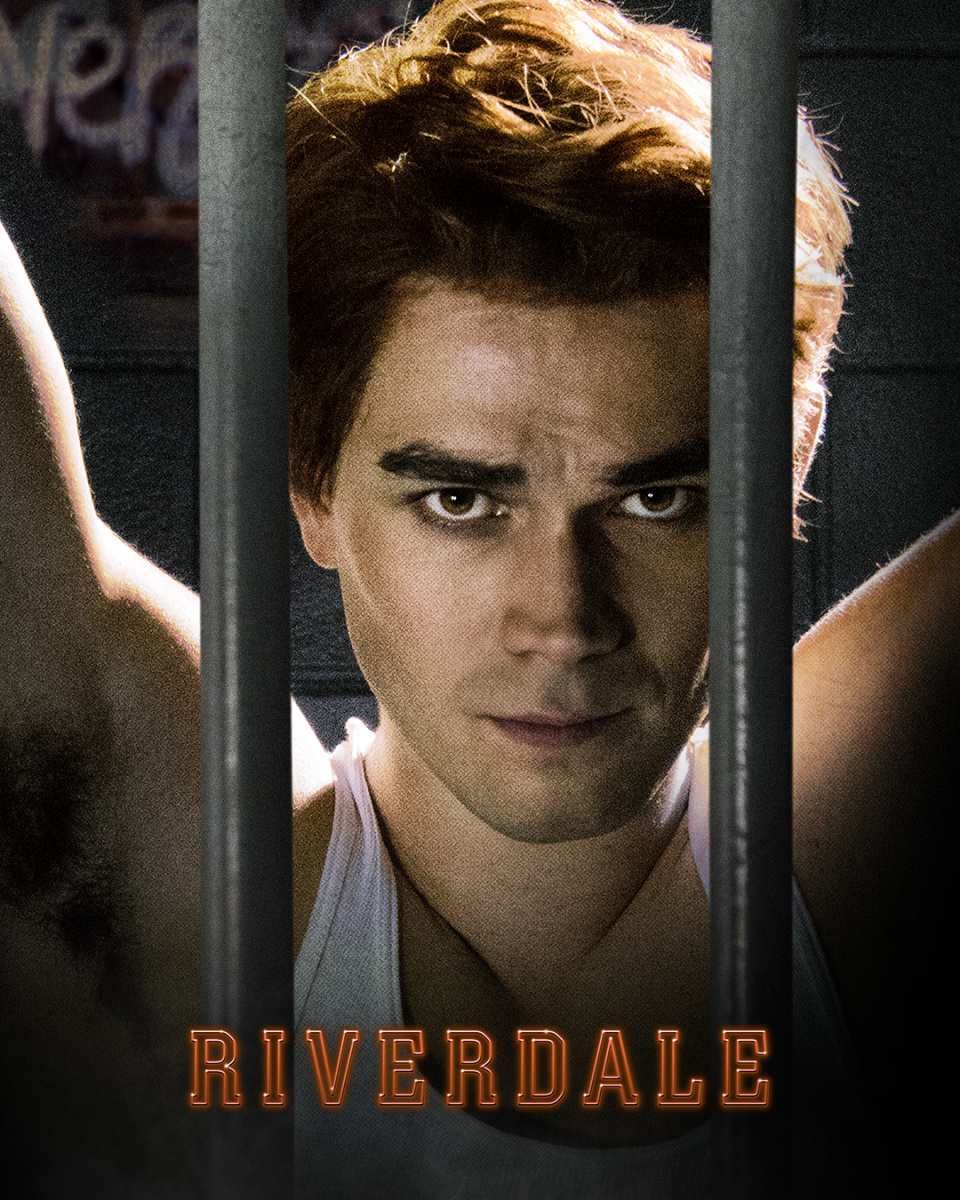Archie Andrews, Jughead Jones, Betty Cooper, and Veronica Lodge have existed for decades in a kind of narrative limbo—but right now, on the CW’s Riverdale, they’re getting ready to go to college. They’ve certainly earned it: For four seasons, these supposedly all-American teens have solved murders, broken out of prison, and done battle with a supernatural role-playing game cult.
Betty’s dad being a serial killer was not exactly a logical next step; the characters of the Archie universe were supposed to be the definition of 1950s wholesome. Its shepherds knew something different: The thing that’s actually important about Jughead isn’t where he goes to college, or whether his family has been involved in a decades-old secret society (don’t ask)—it’s his love of food and his friendship with Archie. That’s why Archie fits so well into today’s intellectual-property-hungry entertainment industry—why take a risk by developing a new set of characters when these established ones are right there?
Whether it’s the entire Marvel or DC catalogs of comic book history, the still-spiraling Harry Potter spin-offs, or Disney’s mass-production of Star Wars, a massive chunk of popular media consists of repurposed previously existing IP. But for each success, there are hundreds, if not thousands, of properties lost in the churn of the entertainment industry. What is the life cycle of a piece of intellectual property that was never intended to last forever?
The path from Archie’s creation to Riverdale was not particularly smooth—the history of the Archie IP is largely a history of the company defending its right to do what it wanted with Archie in a series of intellectual property disputes, some with more merit than others. Eventually, Archie Comics wound up in the right place at the right time to become a multimedia empire. Here’s how this stable of characters went from sketches to a business juggernaut.

THE BIRTH OF ARCHIE ANDREWS
Right from the beginning, there was already some dispute over the ownership of the Archie characters. The company that later became Archie Comics was founded in 1939 as MLJ Comics. In December 1941, the character Archie Andrews first appeared in Pep Comics No. 22, in a story signed by the writer Vic Bloom and illustrator Bob Montana. Soon after, Archie found his way into several other media: He appeared in the radio program The Adventures of Archie Andrews in 1943, and in a syndicated newspaper strip in 1946—the same year MLJ rebranded as Archie Comics Publications.
Copyright law has been historically punishing for comics creators, who have only recently begun to wriggle out from under the thumb of work-for-hire contracts (if they had contracts at all), as fans started shining a light on the often difficult lives of figures like Batman co-creator Bill Finger and Rocket Raccoon creator Bill Mantlo, left out of the financial bonanza employers derived from their work. (Case in point: “the mother of all copyright cases,” surrounding the work of the acclaimed creator Jack Kirby, which Marvel and Kirby’s heirs ended up settling in 2014 as the case sat on the doorstep of the Supreme Court.) According to a report in The Comics Journal, there are several conflicting accounts of Archie’s creation, and multiple potential claimants to the rights, including John L. Goldwater, the original editor of MLJ Comics, the artists Montana and Joe Edwards, and Bloom.
But with the rights firmly in the hands of the company, Archie appeared in more and more media throughout the 1960s, from a series of animated shows produced by Filmation that ran from 1969 to 1977, two TV movies, and even a chain of restaurants. During the 1960s, Archie had his first major intellectual property battle: an accusation of copyright infringement against Mad humorist Harvey Kurtzman’s Help! magazine, which had begun to publish stories using an Archie parody character named Goodman Beaver. Help! publisher James Warren settled out of court with Archie Comics, paying $1,000 and printing an apology letter in the magazine, according to The Comics Journal. Eventually, Kurtzman was forced to sign over the rights to his satirical characters—the first of multiple instances of Archie Comics absorbing mockery of its characters.

FAST-FORWARD TO THE NEAR PRESENT...
In May 2000, Archie Comics was involved in another copyright dispute, this time over the rights to the Josie and the Pussycats characters in the lead-up to the live action Josie and the Pussycats movie. Dan DeCarlo, co-creator of the Josie characters, sued, claiming that Archie Comics had overstepped its rights to the characters. (While this fight was going on, ABC was airing Sabrina the Teenage Witch, based on another character created by DeCarlo.) “Archie probably won’t be around in five years,” one former Archie cartoonist told The New York Times. “Kids aren’t reading comic books.”
DeCarlo lost the case, in part because he had waited too long to take legal action. (He had not been told Josie was going to become an animated cartoon in the 1970s until the day before the first episode of Josie and the Pussycats aired, he recalled in a wide-ranging interview with The Comics Journal in 2000.) But in addition to the action against Kurtzman and the conflict with DeCarlo, Archie Comics has been involved in several other legal disputes, including one against Warner Music Group over the name of the band the Veronicas. ( Warner Bros. Television, by then no longer connected to Warner Music Group, would later go on to produce Riverdale.)

LAWSUITS ENSUE
During this period, two paths appeared for the future of Archie Comics. Chairman Michael I. Silberkleit and President Richard H. Goldwater, children of original Archie owners Louis Silberkleit and John L. Goldwater, were of one mind on how to bring Archie into the new millennium. “The importance is the image of Archie, which everybody knows is good, clean, wholesome stuff,” Silberkleit told The New York Times. “Without that image, we’re nothing.” But after Richard died, in 2007, and Michael did as well just months later, this guiding belief was put to the test.
For several of the years that followed, Richard’s half-brother Jonathan Goldwater—who became CEO and publisher of Archie Comics, positions he holds today—was engaged in fierce litigation with Michael’s widow, Nancy Silberkleit, his co-CEO, who allegedly wanted to maintain the family-friendly image of the company. (Jonathan, along with other representatives of Archie Comics and the CW, declined to comment for this story.)
Richard initiated the multifaceted legal battle in 2011 when he, with the company as co-plaintiff, filed for a restraining order against Nancy for disruptive behavior, including an incident in which she allegedly yelled “Penis! Penis! Penis!” at a series of employees. Nancy countersued, and the scions quickly settled. But the peace wasn’t to last. In 2013, several Archie employees sued Nancy for a range of alleged harassment activities, including the “Penis!” incident and her having invited Hell’s Angels to come to the office to “intimidate” employees, according to reports at the time. Jonathan’s nieces, through their lawyer, also weighed in, contributing to the legal miasma surrounding Archie.

WHEN FANTASY ARCHIE BECAME REAL ARCHIE
Still, today’s creative direction for all Archie properties—and the company’s success—runs right through an unauthorized usage of the characters. Roberto Aguirre-Sacasa spent much of his childhood drawing himself into his own fan Archie comics, an “unhealthy obsession” that eventually led him to write and produce 2003’s Archie’s Weird Fantasy, a play in which Archie realizes he’s gay and moves to New York. Archie Comics sent him a cease-and-desist order, and the play premiered under a different name—but just over a decade later, in 2014, Aguirre-Sacasa became the chief creative officer of Archie Comics. With the legal and corporate right to the Archie football, he took it and ran with it.
Aguirre-Sacasa had struck gold in 2013 with Afterlife With Archie, a comic book series that explored what might happen if Riverdale fell victim to a zombie outbreak. On a Riverdale podcast, Aguirre-Sacasa said: “What that demonstrated, to me and to the folks at Archie—the editor in chief and publisher Jon Goldwater, the owner of Archie—was that you could take these characters, and as long as you didn’t betray what they were, as long as you honored their core, you could throw them into any situation and it would serve to illuminate the characters.” With the foundation for that level of experimentation in place in the relatively cheap comics world, the stage was set for more ambitious work.

THE REBIRTH OF ARCHIE ANDREWS
Eventually, Aguirre-Sacasa was canvassing Los Angeles as part of what The New York Times described as Goldwater’s plan to “expand Archie into a megabrand with help from outside investors and the Hollywood uber-agent Ari Emanuel.” Goldwater was definitively calling the shots: Producer Sarah Schecter bought the idea for the live-action Archie, initiating what Aguirre-Sacasa described as three months of complicated negotiations to make deals for himself, the director Jason Moore, and the rights with Goldwater and Archie Comics.
According to TV Guide, during an early meeting held to discuss a potential movie version of what would become Riverdale, an executive suggested to Aguirre-Sacasa that the live-action Archie be a time-travel story, or one starring Louis C.K. as an adult Archie. Though the film version of Archie floundered, Schecter wound up working with the TV super-producer Greg Berlanti, and, in October of 2014, Deadline announced that Riverdale had a script deal at Fox. (Notably, Aguirre-Sacasa, Berlanti, and the Archie Comics brand itself were all represented by the agency William Morris Endeavor (WME), of which Emanuel is co-CEO.) Aguirre-Sacasa credits Berlanti’s suggestion that the show incorporate a “dead body” for kick-starting the Archie-meets– Twin Peaks approach that characterizes Riverdale today.

THE TRAIL ALWAYS ENDS IN RIVERDALE
Once Riverdale debuted as a hit, albeit at the CW instead of Fox, the business conditions were in place for a run on Archie. Netflix already had friendly deal in place with Warner Bros., and though The Chilling Adventures of Sabrina was originally in development at the CW, Netflix wound up offering far more money. After the long path to Riverdale, everything that came after was pretty straightforward: If something is working, do more of it. (The CW relies heavily on the TV equivalent of a sprawling cinematic universe; the shows that spun off from Berlanti’s Arrow alone add up to more than 500 episodes, while the Vampire Diaries extended universe is nearing 300.)
As with similarly successful pieces of IP, Archie has exploded in recent years, to the point where Archie Comics has looped all the way back around—the appropriately named Road to Riverdale comic series is based on the continuity and versions of the characters created for TV, depictions that echo in the ongoing Archie and Jughead series, among others. All the many iterations play around with the basic kernel of the property: that Archie, a redheaded all-American boy, lives in the town of Riverdale, along with his love interests Betty and Veronica, and his friend Jughead. Pretty much everything else is up for dispute.
Follow Eric Thurm on Twitter.
from VICE https://ift.tt/3encRGW
via cheap web hosting
No comments:
Post a Comment